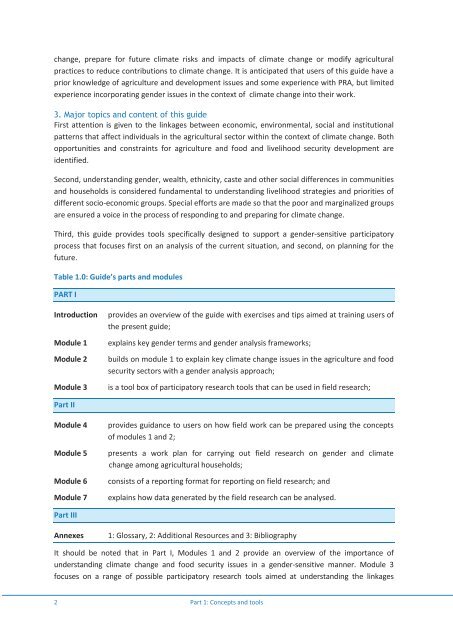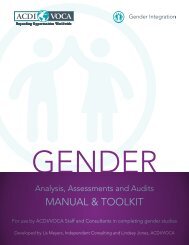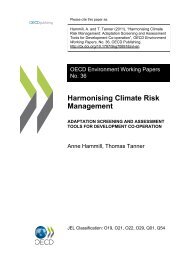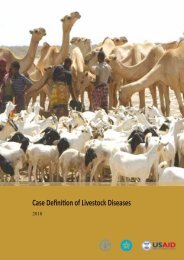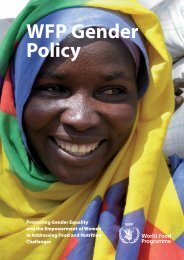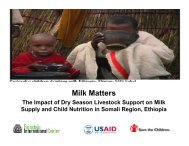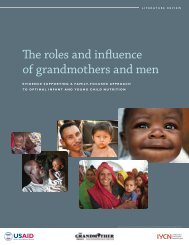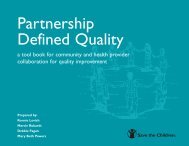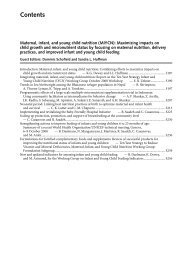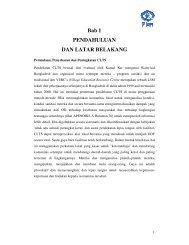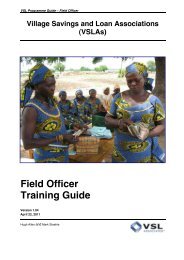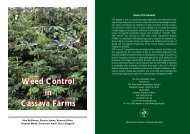Gender and climate change research in - FAO
Gender and climate change research in - FAO
Gender and climate change research in - FAO
Create successful ePaper yourself
Turn your PDF publications into a flip-book with our unique Google optimized e-Paper software.
<strong>change</strong>, prepare for future <strong>climate</strong> risks <strong>and</strong> impacts of <strong>climate</strong> <strong>change</strong> or modify agricultural<br />
practices to reduce contributions to <strong>climate</strong> <strong>change</strong>. It is anticipated that users of this guide have a<br />
prior knowledge of agriculture <strong>and</strong> development issues <strong>and</strong> some experience with PRA, but limited<br />
experience <strong>in</strong>corporat<strong>in</strong>g gender issues <strong>in</strong> the context of <strong>climate</strong> <strong>change</strong> <strong>in</strong>to their work.<br />
3. Major topics <strong>and</strong> content of this guide<br />
First attention is given to the l<strong>in</strong>kages between economic, environmental, social <strong>and</strong> <strong>in</strong>stitutional<br />
patterns that affect <strong>in</strong>dividuals <strong>in</strong> the agricultural sector with<strong>in</strong> the context of <strong>climate</strong> <strong>change</strong>. Both<br />
opportunities <strong>and</strong> constra<strong>in</strong>ts for agriculture <strong>and</strong> food <strong>and</strong> livelihood security development are<br />
identified.<br />
Second, underst<strong>and</strong><strong>in</strong>g gender, wealth, ethnicity, caste <strong>and</strong> other social differences <strong>in</strong> communities<br />
<strong>and</strong> households is considered fundamental to underst<strong>and</strong><strong>in</strong>g livelihood strategies <strong>and</strong> priorities of<br />
different socio-economic groups. Special efforts are made so that the poor <strong>and</strong> marg<strong>in</strong>alized groups<br />
are ensured a voice <strong>in</strong> the process of respond<strong>in</strong>g to <strong>and</strong> prepar<strong>in</strong>g for <strong>climate</strong> <strong>change</strong>.<br />
Third, this guide provides tools specifically designed to support a gender-sensitive participatory<br />
process that focuses first on an analysis of the current situation, <strong>and</strong> second, on plann<strong>in</strong>g for the<br />
future.<br />
Table 1.0: Guide’s parts <strong>and</strong> modules<br />
PART I<br />
Introduction<br />
Module 1<br />
Module 2<br />
Module 3<br />
provides an overview of the guide with exercises <strong>and</strong> tips aimed at tra<strong>in</strong><strong>in</strong>g users of<br />
the present guide;<br />
expla<strong>in</strong>s key gender terms <strong>and</strong> gender analysis frameworks;<br />
builds on module 1 to expla<strong>in</strong> key <strong>climate</strong> <strong>change</strong> issues <strong>in</strong> the agriculture <strong>and</strong> food<br />
security sectors with a gender analysis approach;<br />
is a tool box of participatory <strong>research</strong> tools that can be used <strong>in</strong> field <strong>research</strong>;<br />
Part II<br />
Module 4<br />
Module 5<br />
Module 6<br />
Module 7<br />
provides guidance to users on how field work can be prepared us<strong>in</strong>g the concepts<br />
of modules 1 <strong>and</strong> 2;<br />
presents a work plan for carry<strong>in</strong>g out field <strong>research</strong> on gender <strong>and</strong> <strong>climate</strong><br />
<strong>change</strong> among agricultural households;<br />
consists of a report<strong>in</strong>g format for report<strong>in</strong>g on field <strong>research</strong>; <strong>and</strong><br />
expla<strong>in</strong>s how data generated by the field <strong>research</strong> can be analysed.<br />
Part III<br />
Annexes<br />
1: Glossary, 2: Additional Resources <strong>and</strong> 3: Bibliography<br />
It should be noted that <strong>in</strong> Part I, Modules 1 <strong>and</strong> 2 provide an overview of the importance of<br />
underst<strong>and</strong><strong>in</strong>g <strong>climate</strong> <strong>change</strong> <strong>and</strong> food security issues <strong>in</strong> a gender-sensitive manner. Module 3<br />
focuses on a range of possible participatory <strong>research</strong> tools aimed at underst<strong>and</strong><strong>in</strong>g the l<strong>in</strong>kages<br />
2 Part 1: Concepts <strong>and</strong> tools


